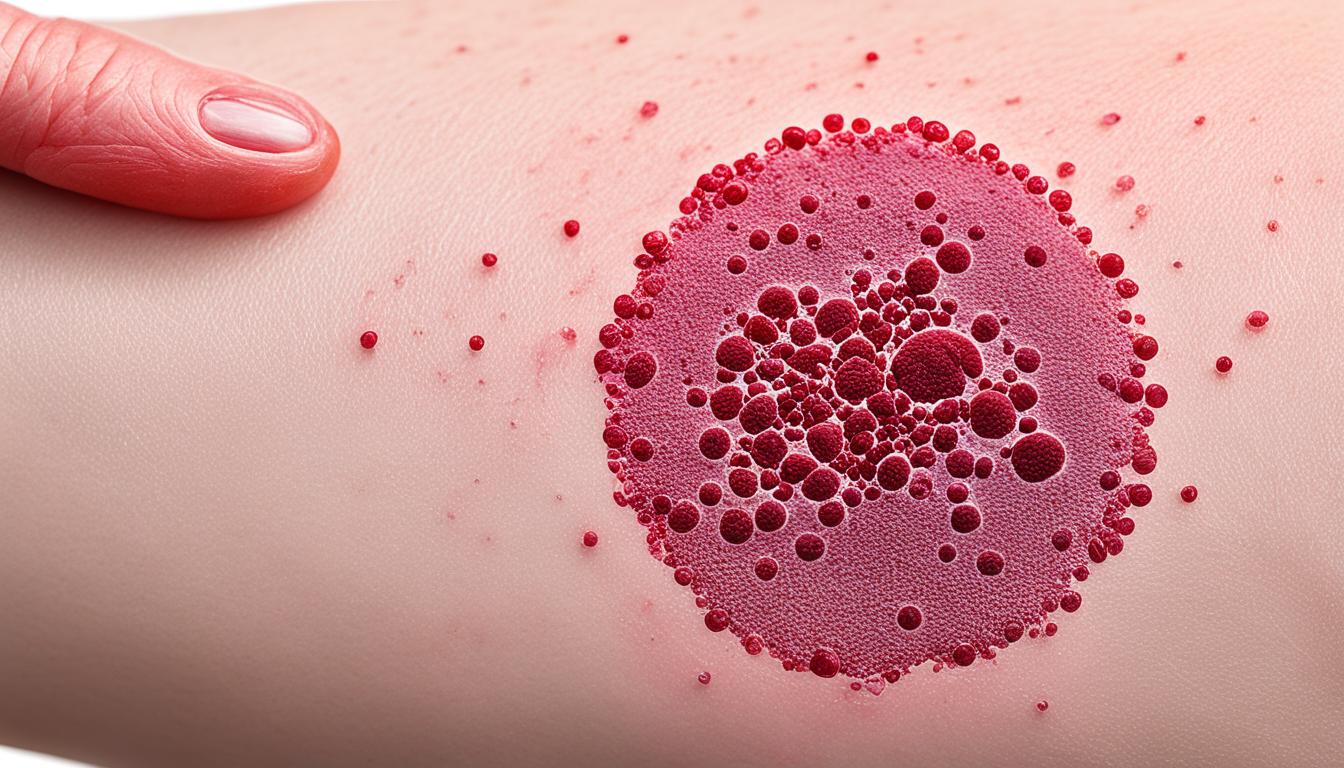Fungal infections are caused by a fungus. This can be a yeast or a mold. These infections can happen on the skin, nails, mouth, throat, and other parts of the body. Fungi are everywhere, but only a few types make us sick.
Ringworm is a type of fungal infection. It affects the skin and can look like red, swollen patches. It can also change the way nails look. Anyone can get it, but some people are more likely to. These include those with poor circulation, diabetes, or a weak immune system.
Most of the time, these infections are not dangerous. But, they can be harmful for those with weak immune systems. Fungal infections come in different types based on where they are. For example, they can be on the skin, under the skin, or inside organs like the lungs or brain.
Key Takeaways:
- Ringworm is a type of fungal infection that affects the skin and nails.
- While there are many types of fungi, only a few cause diseases in people.
- Symptoms of ringworm can include red, swollen skin or bumpy patches.
- People with poor blood flow, diabetes, or a weak immune system are more at risk.
- Getting the right treatment and preventing infections can help manage ringworm.
What is Ringworm and its Causes?
Ringworm is a common fungal infection that shows up on the skin. It can be found on the scalp, feet, groin, hands, and in other spots. The fungi Trichophyton, Microsporum, and Epidermophyton often cause it.
Many things can lead to getting ringworm. Not washing your hands often is a big one. So is wearing wet clothes or using dirty towels. Bathing in unclean water, especially in public, can also raise your risk.
You can get ringworm by touching someone or something that’s infected. Sharing clothes, combs, or towels can spread it. Also, being in dirty water, like in pools or showers, where the fungi live, increases your chances.
Doing things to stop ringworm’s spread is important. Always wash your hands with soap, especially when you touch something that might have fungi. Don’t share your things. And keep your clothes clean and dry. This decreases the risk of getting the infection.
Knowing how ringworm spreads and keeping clean can help a lot. It stops the infection from spreading, which keeps everyone healthy.
Symptoms, Treatment, and Prevention of Ringworm
Ringworm is a fungal skin infection. It shows up with red, itchy rashes. These rashes are often bumpy. They can appear anywhere on the body. If not treated early, they can spread. Knowing how to treat and prevent ringworm is important.
Symptoms of Ringworm
Ringworm causes red, itchy rashes. These rashes might swell and have a raised border. In some cases, they can turn into blister-like sores. This makes the infection more painful. Avoid scratching it. This can make it worse and spread the infection.
Treatment for Ringworm
Rubbing topical antifungal creams on the skin helps. It includes drugs like Ketoconazole and Miconazole. These medicines kill the fungus and ease the symptoms. For more serious cases, oral medications like Itraconazole are used. They help fight the infection from inside the body.
Prevention of Ringworm
Good hygiene is key to keeping ringworm away. Here are some tips:
- Don’t share clothes, towels, or personal items with someone who has ringworm.
- Wear clean, dry clothes. Fungi love warm, damp places.
- Keep your home clean. Disinfect items that might have fungus on them.
- Avoid touching the skin of infected people, especially in crowded areas.
- Keep your skin dry. Focus on areas that sweat a lot.
Follow these steps and maintain good hygiene. This reduces your risk of getting ringworm.
Image:
Conclusion
Ringworm is a common fungal infection that affects the skin. It spreads through poor hygiene, dirty water, and by touching things that are contaminated. You might see red, itchy rashes if you get infected. These rashes can spread if they’re not treated.
To treat ringworm, doctors usually recommend antifungal drugs. These can be creams or pills. It’s important to use the medicine as the doctor says to. You should also keep clean to stop it from coming back.
To prevent ringworm, good hygiene is key. Don’t share your stuff, wear clean, dry clothes, and avoid contact with people who are infected. Doing these things lowers your chance of getting ringworm.
In summary, ringworm is a fungal infection that can be kept under control. Good hygiene and proper treatment are the best ways to deal with it. By knowing how to spot, avoid, and treat ringworm, you can keep your skin healthy.

